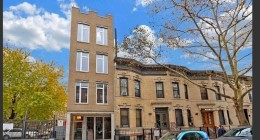This week, NPR and several other major media outlets ran a story about how one Florida man chose to respond to book bans throughout his state.
Chaz Stevens is a middle age white activist, known for doing some tongue-in-cheek protests. His latest involves petitioning Florida schools to remove the Bible from libraries because of its inappropriate content for minors. In addition to banning the Bible, his letter to school superintendents across the state asked for any books referencing the Bible to also be pulled.
The intention behind this set of book challenges — humorous or not — garnered a lot of attention. Many lauded the efforts, suggesting that if books are being banned in schools that contain sex, inappropriate language, or images that are unsuitable for minors, so, too, should the Bible. Besides, the Bible is what many of these right-wing censors really want to push in curriculum and classroom, so it hits the same spot on them that the wave of contemporary book bans on everyone else.
But stunts like this do more harm than good. They’re arguably a step back in the fight for intellectual freedom and against censorship. Rather than show up to defend books being removed from shelves at school board meetings, Stevens and others who are choosing to protest books in the name of “fairness” to right-wing folks are doing it simply create publicity for themselves and further strain the time and energy of already overburdened school administrators, board members, and educators.
Demanding books be banned to combat book bans isn’t clever or funny. It’s not subversive. It’s harmful. It actively works against the cause of anti-censorship and First Amendment rights and sets forward momentum gained in the work another step backward. More, it gains the kind of media attention that the hard work doesn’t see and thus, cannot be enhanced or supported by. Pointing out hypocrisy has been done over and over — and it doesn’t work.
Fighting book bans with more book bans does not work and it should not work. Fighting book bans requires time, energy, and money, and it requires showing up to school boards, to library boards, and in your own community. It requires giving money to organizations that are on the ground doing the work, mobilizing people to speak up and defend the rights of all people to access materials they wish to. It is not about engaging hate with more hate. This mobilizes nobody and creates significant distraction.
Let’s stop cheering on these efforts and instead demand that outlets like NPR and others give attention to ground-level efforts that aren’t about publicity but are instead about going in and doing the hard and thankless work. As has been said over and over again, much of this can be directly attributed to the death of local journalism, the rise of fake news, and the need to hit the sweet spot in the algorithm to earn clicks.
The very same things being exploited by right-wing groups eager to remove books from libraries across the country.
Call To Action
There are several elections happening around the country this spring that have school boards on the ballot. If you’re in Nebraska, North Carolina, Oklahoma, Tennessee, or Texas, make sure you’re showing up to the polls to elect your candidates for fall general elections or make your vote on who will be leading your local school district soon. This will be the most important thing you do for anti-censorship work right now.
Want to do more if you’re in those states or are in a state not currently electing officials? Look at what laws are being considered in your state when it comes to education. The last two weeks have brought a wave of censorship related bills, including in Kentucky, Arizona, and Georgia. Write to your legislators and tell them to defend the rights of all readers.

We’re launching a new newsletter dedicated to all things literary activism. These bimonthly newsletters will begin hitting inboxes in May, packed with the stories and calls to action we’re putting together here at Book Riot. Expect censorship roundups as well as news stories that offer ways to put your passion for books and literacy into meaningful action and change.
Click the image above to sign up or click here.
For more ways to take action against censorship, use this toolkit for how to fight book bans and challenges, as well as this guide to identifying fake news. Then learn how and why you may want to use FOIA to uncover book challenges.
Book Censorship News: April 29, 2022
- Connetquot School District in New York has pulled Gender Queer from shelves for review after parental complaints.
- Parents debate books and censorship in Hall County, Georgia. There’s nothing specific here, other than a complaint about Eleanor and Park, but more shows up in this piece, including complaints about Dear Martin.
- A look at the scope of books being challenged across Florida.
- In Polk County, Florida, two books were approved for the schools, including The Bluest Eye and Tricks. Several more are being reviewed.
- Medford, Oregon, schools pull the graphic novel edition of The Handmaid’s Tale from shelves.
- Absolutely True Diary of a Part-Time Indian is being reviewed for suitability in Ottumwa, Iowa.
- The emails detailing what happened when a book about unicorns was challenged and removed in Buckeye Valley, Ohio, say a whole lot.
- Janell Ressler, a frequent flier at the Littlestown Area School Board meetings in Pennsylvania has challenged 35 books. Six of the books were already approved and will not be evaluated, including The Kite Runner, Monday’s Not Coming, Beloved, The Hate U Give, Looking for Alaska, and The Glass Castle.
- Here’s what is happening with a host of book challenges in Savannah, Georgia. There are several links worth checking out in this story, particularly where teens speak up for their rights to read.
- The Great Bear and two other contested books are back on shelves in Durham District Schools in Ontario, Canada.
- I’m paywalled so can’t provide more, but Lawn Boy has been challenged in Ramsey, New Jersey, area schools.
- Students in the Williamsburg-James City school district in Virginia will continue using textbooks that are more than ten years old because of parents. This is what is going to keep happening in schools across the country with so much “parental oversight” of textbooks — the real losers are the kids who continue learning from outdated text books.
- ROWVA Illinois continues to be mired in a mess and now, a teacher claims the school board did not allow her to be hired because she did not support banning The Hate U Give earlier this school year.
- A politically charged school board in Wausau, Wisconsin, has made some curriculum choices that are shrouded in both confusion and censorship. In the coming school year, the district plans to begin implementing the Wit and Wisdom curriculum, and at the April school board meeting, the presenters discussed four of the texts within the curriculum that were a source of contention elsewhere in the country. Citing Williamson County, Tennessee — remember them? — the new curriculum preemptively removed four books:

On a Personal Note
Over the last few months, on no discernible timeline, I’ve received a weird array of messages on Instagram. The messages began in February and continued this week. Each is a defense of Ann Burlingame, who I wrote about last December. An FOIA request of emails about the removal of Gender Queer from the Wake County Public Library revealed less-than-flattering (the book has been returned to shelves). messages from Burlingame.
Burlingame’s daughter is the messenger, who believes that my career grows because of stories like this. The fact of the matter is that my job is to share facts and the facts were laid out clearly in the requested emails.
One of the reasons it is impossible to understand the true breadth of quiet or silent self-censorship is because of things like this. Teachers and librarians know by making the decision to speak up about challenges or the decision to purchase potentially “contentious” material they’ll be subject to harassment like this, but in a way that puts their livelihoods on the line. It’s impossible to emphasize this — no matter how passionately anti-censorship educators may be, they feel this pressure in a way that someone like me does not. More, all correspondence of those in public government is able to be accessed via FOIA. This means email, and it means that, like I did with Burlingame’s messages, any person who wishes to access that communication has the legal right to do so. It is far safer for an educator or librarian to keep it quiet than risk their lives over a choice. It’s ethically wrong, but so, too, is the fact the American capitalist system depends upon workplace provided healthcare, among other realities.



Sorry, Maggie, but it isn’t a private conversation if it’s on the public record. When you decide to approach a writer doing their job, it’s no longer private, either. *Note that the message, sent privately, has been covered up to protect an individual’s privacy.






